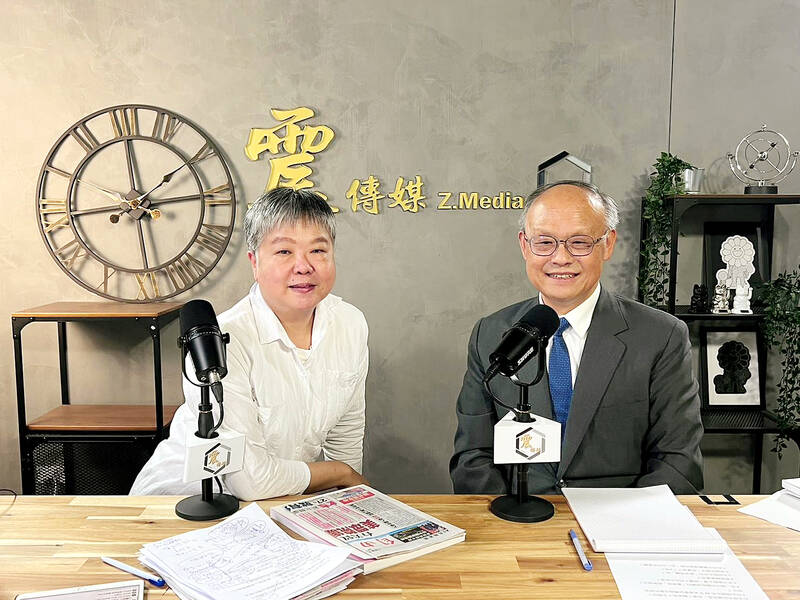The US House of Representatives on Wednesday approved the first agreement under the US-Taiwan Initiative on 21st-Century Trade, sending it to the US Senate where it is expected to be ratified.
The initiative streamlines customs checks, looks to improve regulatory procedures and establishes anti-corruption measures.
The American Institute in Taiwan signed the agreement on June 1 with the Taipei Economic and Cultural Representative Office in the US.

Photo courtesy of Z.Media
In Taipei, Minister Without Portfolio John Deng (鄧振中) said that expanding agricultural exports to the US would be a priority issue in negotiations of the second phase of the initiative.
Deng in an interview with media personality Frances Huang (黃光芹) said that environmental protection and labor issues would also be high on the agenda for negotiations in the second part of the trade initiative with the US.
The agreement covers 81 articles in five key areas and is a complete pact, Deng said, adding that it has legal basis and is a formal accord, unlike most of the deals previously signed with the US, which were in the form of memorandums.
The agreement covers the areas of customs administration and trade facilitation, good regulatory practices, services domestic regulation, anti-corruption, and small and medium-sized enterprises.
Taiwan and the US are to hold trade talks on the more complicated topics of environmental protection, labor and agricultural issues, Deng said.
On the issue of agriculture, the focus would be on Taiwan’s exports of agricultural products to the US, he said.
China used to be the largest market for Taiwanese agricultural exports.
However, Beijing has over the past few years banned the importation of several Taiwanese agricultural products, prompting the nation to shift exports to Singapore and Japan, he added.
The US is the biggest market for Taiwan’s agricultural goods and processed agricultural products, Deng said.
Regarding environmental protection, Taiwan would seek an environmental protection agreement with Washington, Deng said.
The government also hopes to create a favorable work environment for Taiwanese, he added.
The topics in the next phase of talks would be “a little more difficult” to discuss than the previous five items, Deng said.

The Ministry of Economic Affairs has fined Taobao NT$1.2 million (US$36,900) for advertisements that exceeded its approved business scope and ordered the Chinese e-commerce platform to make corrections in the first half of this year or its license would be revoked. Lawmakers have called for stricter supervision of Chinese e-commerce platforms and more stringent measures to prevent China from laundering its goods through Taiwan as US President Donald Trump’s administration cracks down on origin laundering. The legislature’s Finance Committee yesterday met to discuss policies to prevent China from dumping goods in Taiwan, inviting government agencies to report on the matter. Democratic Progressive Party

Taiwan and its Pacific ally Tuvalu on Tuesday signed two accords aimed at facilitating bilateral cooperation on labor affairs, according to Taiwan’s Ministry of Foreign Affairs (MOFA). The governments inked two agreements in Taipei, witnessed by Foreign Minister Lin Chia-lung (林佳龍) and visiting Deputy Tuvaluan Prime Minister Panapasi Nelesone, MOFA said in a news release. According to MOFA, the agreements will facilitate cooperation on labor issues and allow the two sides to mutually recognize seafarers’ certificates and related training. Taiwan would also continue to collaborate with Tuvalu across various fields to promote economic prosperity as well as the well-being of their

Taiwan would welcome the return of Honduras as a diplomatic ally if its next president decides to make such a move, Minister of Foreign Affairs Lin Chia-lung (林佳龍) said yesterday. “Of course, we would welcome Honduras if they want to restore diplomatic ties with Taiwan after their elections,” Lin said at a meeting of the legislature’s Foreign Affairs and National Defense Committee, when asked to comment on statements made by two of the three Honduran presidential candidates during the presidential campaign in the Central American country. Taiwan is paying close attention to the region as a whole in the wake of a

NEW WORLD: Taiwan is pursuing innovative approaches to international relations through economics, trade and values-based diplomacy, the foreign minister said Taiwan would implement a “three-chain strategy” that promotes democratic values in response to US tariffs, Minister of Foreign Affairs Lin Chia-lung (林佳龍) said. Taiwan would aim to create a “global democratic value chain,” seek to capitalize on its position within the first island chain and promote a “non-red supply chain,” Lin was quoted as saying in the ministry’s written report to the Legislative Yuan submitted ahead of the legislature’s Foreign Affairs and National Defense Committee meeting slated for today. The Ministry would also uphold a spirit of mutual beneficial collaboration, maintaining close communication and consultations with Washington to show that Taiwan-US cooperation